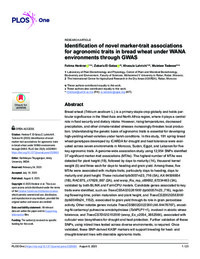Identification of novel marker-trait associations for agronomic traits in bread wheat under WANA environments through GWAS

Authors:
Bread wheat (Triticum aestivum L.) is a primary staple crop globally and holds particular significance in the West Asia and North Africa region, where it plays a central role in food security and dietary intake. However, rising temperatures, decreased precipitation, and other climate-related stresses increasingly threaten local production. Understanding the genetic basis of agronomic traits is essential for developing high-yielding wheat varieties under harsh conditions. In this study, 191 spring bread wheat genotypes developed by ICARDA for drought and heat tolerance were evaluated across seven environments in Morocco, Sudan, Egypt, and Lebanon for five key agronomic traits. A genome-wide association study using 12,954 SNPs identified 37 significant marker-trait associations (MTAs). The highest number of MTAs was detected for plant height (19), followed by days to maturity (14), thousand kernel weight (5) and three each for days to heading and grain yield. Among these, five MTAs were associated with multiple traits, particularly days to heading, days to maturity and plant height. These included tplb0057m23_716 (5A), AX-94506854 (1B), RAC875_c17628_867 (2A), and wsnp_Ra_rep_c69692_67234463 (3A), validated by both BLINK and FarmCPU models. Candidate genes associated to key traits were identified, such as TraesCS5A02G261900 (tplb0057m23_716), regulating flowering time, pollen maturation and plant height, and TraesCS2D02G583000 (tplb0049b24_1152), associated to grain yield through its role in grain peroxidase activity. Other notable genes include TraesCS5B02G022300 (AX-94476767), encoding N-carbamoyl putrescine amidohydrolase (TaNPLP1−1), involved in abiotic stress tolerance, and TraesCS7D02G102000 (wsnp_Ex_c2054_3852564), associated with cuticular wax biosynthesis for drought and heat protection. Further validation of these SNPs, using inbred lines tested across diverse environments, is required. Once validated, these SNP-derived KASP markers will support breeding for heat- and drought-tolerant lines with desirable agronomic traits.
